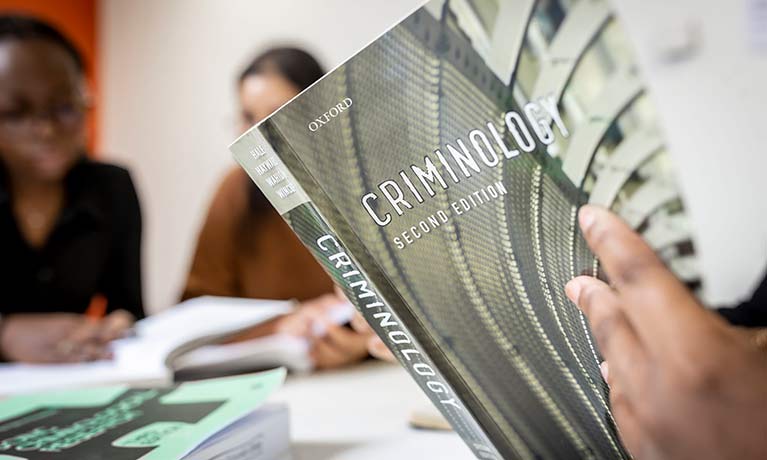Search
Criminology and Criminal Justice MA
Study level: PostgraduateConversion course

Enhance your employability by investigating societal responses to crime, deviance and social harm on local, national and global levels.
Year of entry
2025-26
Location
Coventry University (Coventry)
Study mode
Full-time
Duration
1 year full-time
Course code
CAST009
Start date
September 2025
November 2025
January 2026
March 2026
May 2026
July 2026
Course overview
Whether you're a keen criminology student or a seasoned professional, our course aims to equip you with an advanced understanding of crime and social harm's impact on individuals, communities and society.
Key course content includes:
- criminological theory: gain an advanced understanding of the causes of global crime and social harm.
- criminal justice policy: develop the skills to evaluate national and international criminal justice policy.
- practical case studies: analyse real-world cases that highlight the underlying connections between academic theory, policy and practice.
- research methods: explore the key research approaches that are employed by criminologists and social researchers to study crime, justice and the social world.
- professional networking: benefit from our close links with criminal justice professionals and institutions.
5 QS Stars for Teaching and Facilities
QS Stars University RatingsRanked 9th Modern University in UK by the Times
The Times and Sunday Times Good University Guide 2025Ranked 8th for Overall Satisfaction in PTES
Postgraduate Taught Experience Survey (PTES) 2024Why you should study this course
- Build on the foundational knowledge you have gained from undergraduate studies in criminology, sociology, psychology, law, forensic investigation, policing, politics, and other degree programmes.
- Enhance the practice experience you have gained within an existing career by studying for an advanced academic qualification. We value applications from those already embedded in practice roles.
- Develop industry-relevant skills, knowledge and attributes directly applicable to a career in criminal justice and allied professions.
- You will be taught by subject experts and professionals in the field (staff are subject to change).
- Enhance your employability and career destination opportunities with a master’s degree emphasising the real impact of crime and social harm.
Accreditation and professional recognition

Chartered Management Institute
This course is designed1 to include the criteria set by the Chartered Management Institute (CMI) for the CMI Level 7 Certificate in Strategic Management and Leadership Practice. It is expected that students who successfully pass the Violence, Victims and Trauma module will be eligible to gain the award as an additional qualification.
Do you need a law degree to start a career in law?
Although there are no mandatory courses prior to sitting the solicitors qualifying examinations or CILEX professional stage, Coventry University can kick start your legal career through the following preparation courses.
Read more
What you'll study
We regularly review our course content, to make it relevant and current for the benefit of our students. For these reasons, course modules may be updated.
How you'll learn
Teaching and learning methods for this course may include:
- interactive lectures
- seminars
- tutorials
- workshops.
Teaching contact hours:
As a full-time postgraduate student, you will study modules totalling 180 credits each academic year. A typical 30-credit module requires a total of 300 hours of study. Study hours are made up of teaching contact hours, and guided and independent study.
Teaching hours
Teaching hours may vary, depending on where you are in your studies, but on average you will have between 8 and 12 teaching and learning hours each week. You will also have the opportunity to attend optional sessions including time with a Success Coach or to meet with staff for advice and feedback.
Guided and independent study
Throughout your studies, you will be expected to spend time in guided and independent study to make up the required study hours per module. You will be digging deeper into topics, reviewing what you’ve learnt and completing assignments. This can be completed around your personal commitments. As you progress to the end of your studies, you’ll spend more time on independent learning.
Online learning
As an innovative university, we use different teaching methods, including online tools and emerging technologies. So, some of your teaching hours and assessments may be delivered online.
Assessment
This course will be assessed using a variety of methods which could vary depending on the module. Assessment methods may include:
- scenario-based discussion
- photo essays
- presentations
- Crown Court observation.
The Coventry University assessment strategy aims to ensure that our courses are fairly assessed and allows us to monitor student progression towards achieving the intended learning outcomes.
Entry requirements
Typical entry requirements:
Fees and funding
| Student | Full-time | Part-time |
|---|---|---|
| UK, Ireland*, Channel Islands or Isle of Man | £9,350 per year | Not available |
| EU | £9,350 per year with EU Support Bursary** £18,600 per year without EU Support Bursary** |
Not available |
| International | £18,600 per year | Not available |
For advice and guidance on tuition fees3 and student loans visit our Postgraduate Finance page and see the university's Tuition Fee and Refund Terms and Conditions.
We offer a range of international scholarships to students all over the world. For more information, visit our International Scholarships page.
Tuition fees cover the cost of your teaching, assessments, facilities and support services. There may be additional costs not covered by this fee such as accommodation and living costs, recommended reading books, stationery, printing and re-assessments should you need them.
The following are additional costs not included in the tuition fees:
- Any optional overseas field trips or visits: £400+ per trip.
- Any costs associated with securing, attending or completing a placement (whether in the UK or abroad).
*Irish student fees
The rights of Irish residents to study in the UK are preserved under the Common Travel Area arrangement. If you are an Irish student and meet the residency criteria, you can study in England, pay the same level of tuition fees as English students and utilise the Tuition Fee Loan.
**EU Support Bursary
Following the UK's exit from the European Union, we are offering financial support to all eligible EU students who wish to study an undergraduate or a postgraduate degree with us full-time. This bursary will be used to offset the cost of your tuition fees to bring them in line with that of UK students. Students studying a degree with a foundation year with us are not eligible for the bursary.
Facilities
Have a look round our mock prison cells on our virtual 360 tour. You'll use them to get a sense of the real-life experiences of inmates and for role play learning.

Lanchester Library
The library is usually open 24/7, in term-time. It’s where you can access your course’s specialist Academic Liaison Librarian. It’s also home to specialist teams which can support you with your academic writing and maths and statistics questions.

The Hub
The Hub is the centre of student life on campus. Facilities include a food court, convenience store, multi-faith centre, medical centre, hairdresser, coffee shops and the Your SU offices. It has fully licensed function spaces and a bar.

Careers and employability
Get one-on-one career and employability guidance lasting up to 36 months from the end of your course. We’ll help you find placements and graduate roles, offer CV and application checks, mentoring, skills workshops, employer events and more.
Facilities are subject to availability. Access to some facilities (including some teaching and learning spaces) may vary from those advertised and/or may have reduced availability or restrictions where the university is following public authority guidance, decisions or orders.
Careers and opportunities
Successful graduates may seek the following positions:
- Police officer
- Detective
- Probation officer
- Prison officer
- Witness care service
- Victim support services
- Intelligence analyst
- Fraud investigation
- Academia and research.
On successful completion of this course, you will be able to:
- demonstrate an in-depth understanding of criminological theories related to global crime, social harm, public and media responses to crime, and the complex interagency interface between criminal justice agencies.
- critically evaluate interdisciplinary research related to global crime, social harm, public and media responses to crime, and the workings of the criminal justice system.
- critically analyse the efficacy of criminal justice agencies’ responses to crime, social harm, law and order.
- critically analyse how identity, intersectionality, power and inequality shape victim–offender experiences of both crime and the criminal justice system.
- critically appraise international best practice in criminal justice and inter-related fields such as public protection, risk management, governance, rehabilitation of offenders, victim support and trauma-informed practice.
- produce evidence that demonstrates the ability to apply advanced skills, knowledge and attributes to a range of career pathways within criminal justice and allied fields.
- recognise the potential value of generative artificial intelligence tools within the criminal justice sector and allied careers, while understanding the limitations of such tools and adhering to their transparent use within ethical boundaries.
Where our graduates work
Successful graduates of criminology and criminal justice courses at Coventry University have gone on to work in a variety of roles and companies, including:
- university academic
- police officer, West Midlands Police
- detective, Metropolitan Police
- victim support
- domestic violence charity
- health and safety executive
- police operations analyst
- intelligence support officer
- CPS caseworker
- money laundering intelligence officer
- senior crime investigator
- youth violence intervention
- psychologist.




